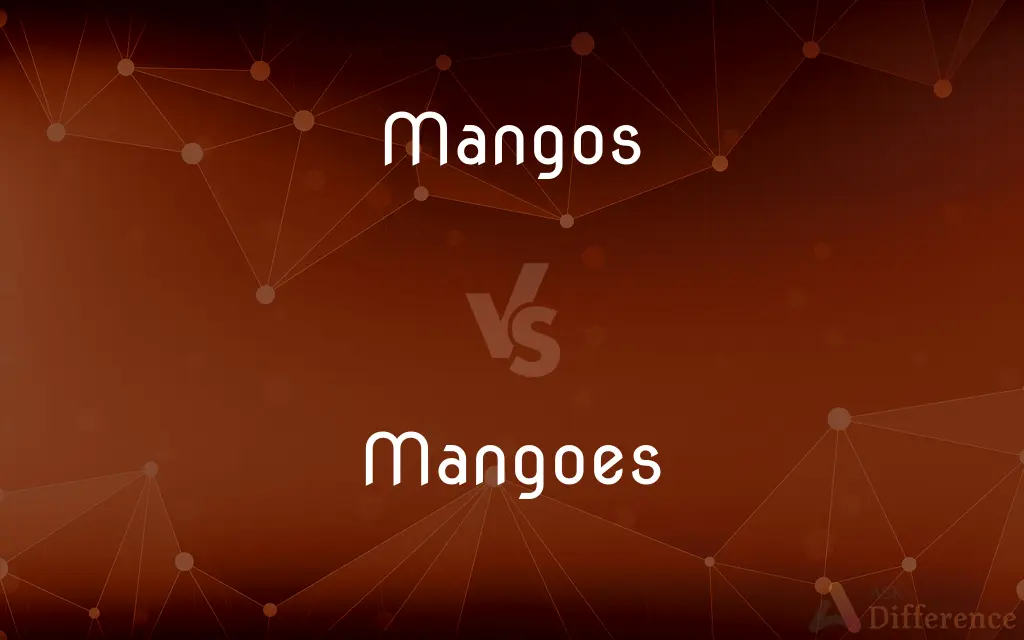Mangos vs. Mangoes — What's the Difference?
Edited by Tayyaba Rehman — By Maham Liaqat — Updated on April 22, 2024
"Mangos" and "mangoes" are both correct plural forms of "mango," referring to the tropical fruit; the choice between them depends on personal or regional preference.

Difference Between Mangos and Mangoes
Table of Contents
ADVERTISEMENT
Key Differences
"Mangos" and "mangoes" both serve as the plural form of the word "mango," which is a sweet, juicy tropical fruit popular around the world. The spelling variations do not indicate any difference in meaning or type of mango, but rather reflect differences in English usage and orthography.
The use of "mangos" is more commonly seen in American English, which often favors more simplified spellings. On the other hand, "mangoes" is more typical in British English, which tends to preserve additional vowels in pluralizations, similar to "heroes" and "potatoes."
Both "mangos" and "mangoes" are accepted in professional and casual writing. The choice between them typically depends on the writer's familiarity with either American or British spelling conventions, or simply personal preference.
Writers or publishers might choose one form over the other based on their target audience. For example, an American audience might be more accustomed to seeing "mangos," whereas a British audience might expect "mangoes."
The choice between "mangos" and "mangoes" does not impact the understanding of the text, as both are widely recognized and accepted. It is simply a matter of stylistic preference or adherence to regional norms of spelling.
ADVERTISEMENT
Comparison Chart
Spelling Variant
American English
British English
Usage
Common in the U.S. and other regions using simplified spellings
Preferred in the U.K., Canada, Australia, and other regions following British English norms
Pronunciation
Same as "mangoes"
Same as "mangos"
Meaning
Plural of "mango," a tropical fruit
Plural of "mango," a tropical fruit
Contextual Preference
Often chosen in American publications and writings
Often used in contexts adhering to British spelling conventions
Compare with Definitions
Mangos
Applies to any context where multiple mango fruits are mentioned.
Mangos are rich in vitamins and minerals.
Mangoes
Suitable in any discussion involving more than one mango.
Mangoes make a great addition to fruit salads.
Mangos
Used to refer to more than one fruit of the mango tree.
The basket was filled with ripe mangos.
Mangoes
Frequently used in British and Commonwealth publications.
The magazine included an article on the health benefits of mangoes.
Mangos
Recognized globally, despite regional spelling preferences.
Mangos are a popular ingredient in tropical smoothies.
Mangoes
Accepted internationally, synonymous with "mangos."
Mangoes are often used in desserts and jams.
Mangos
The plural form of mango, preferred in American English.
He bought a dozen mangos from the market.
Mangoes
Refers to multiple specimens of the tropical fruit.
Fresh mangoes are available at the summer market.
Mangos
Often chosen by American writers and publications.
The cookbook features a recipe for mangos salsa.
Mangoes
The plural form of mango, commonly used in British English.
She peeled the mangoes before slicing them.
Mangos
A tropical evergreen tree (Mangifera indica) native to Asia, widely cultivated for its edible fruit.
Mangoes
A tropical evergreen tree (Mangifera indica) native to Asia, widely cultivated for its edible fruit.
Mangos
The oval fruit of this tree, having a smooth rind, sweet juicy flesh, and a flat one-seeded stone, and eaten ripe or pickled when green.
Mangoes
The oval fruit of this tree, having a smooth rind, sweet juicy flesh, and a flat one-seeded stone, and eaten ripe or pickled when green.
Mangos
Chiefly North Midland US A bell pepper, especially a green one.
Mangoes
Chiefly North Midland US A bell pepper, especially a green one.
Mangos
Plural of mango
Mangoes
Plural of mango
Mangoes
Plural of mangoe
Common Curiosities
Are "mangos" and "mangoes" interchangeable?
Yes, "mangos" and "mangoes" are interchangeable as both are correct plural forms of "mango."
How should I decide which form to use in my writing?
Consider your audience; use "mangos" for an American audience and "mangoes" for a British or international audience familiar with British spelling.
Do "mangos" and "mangoes" refer to different types of mango?
No, both terms refer to the same fruit, with no distinction between types or varieties.
Are there any regional preferences for using "mangos" or "mangoes" in cooking or recipes?
No, the choice of word does not influence culinary use or recipes; it's purely a linguistic preference.
Is the pronunciation different between "mangos" and "mangoes"?
No, the pronunciation of "mangos" and "mangoes" is the same.
Can the use of "mangos" vs. "mangoes" affect readability?
Both forms are widely recognized, so readability is generally unaffected by the choice of spelling.
Is one form more correct than the other?
Neither form is more correct; both are widely accepted and correct plural forms of "mango."
What is the origin of the word "mango"?
The word "mango" originates from the Portuguese word "manga," which they adopted from the Malayalam word "māṅṅa" during their presence in India.
Which spelling should I use, "mangos" or "mangoes"?
The choice depends on your regional spelling preference; "mangos" is common in American English, while "mangoes" is typical in British English.
How do publishers choose between "mangos" and "mangoes"?
Publishers typically choose based on the preferred spelling conventions of their target audience or the style guide they follow.
What advice do style guides give regarding the use of "mangos" vs. "mangoes"?
Style guides typically advise consistency with regional spelling norms; for example, American style guides might recommend "mangos," while British guides prefer "mangoes."
Do dictionaries list both "mangos" and "mangoes"?
Yes, modern dictionaries usually list both "mangos" and "mangoes" as acceptable plural forms of "mango."
Can switching between "mangos" and "mangoes" in a text be considered a spelling error?
Not if the context allows flexibility in English usage; however, consistency within a single document is recommended.
How do educational systems in different countries teach these variants?
Educational systems generally teach the spelling variant that aligns with their national standard of English.
Is there a trend in favoring one spelling over the other in recent years?
There is no clear trend; usage tends to reflect broader shifts towards American or British English influences globally.
Share Your Discovery

Previous Comparison
Minimalize vs. Minimize
Next Comparison
Sweet vs. SweatAuthor Spotlight
Written by
Maham LiaqatEdited by
Tayyaba RehmanTayyaba Rehman is a distinguished writer, currently serving as a primary contributor to askdifference.com. As a researcher in semantics and etymology, Tayyaba's passion for the complexity of languages and their distinctions has found a perfect home on the platform. Tayyaba delves into the intricacies of language, distinguishing between commonly confused words and phrases, thereby providing clarity for readers worldwide.
















































